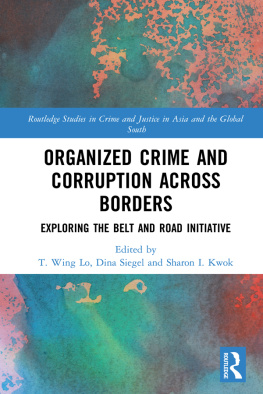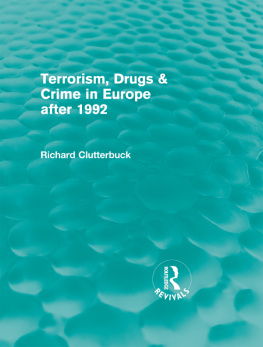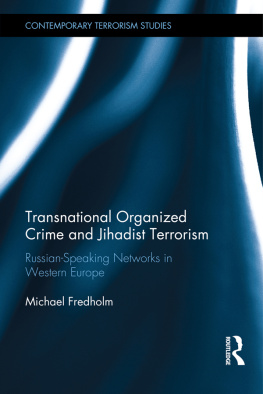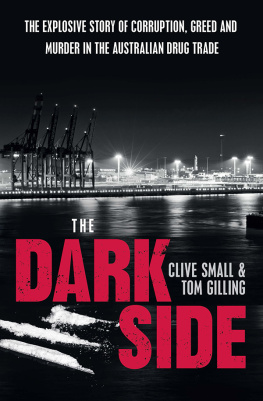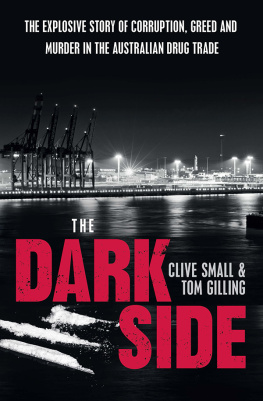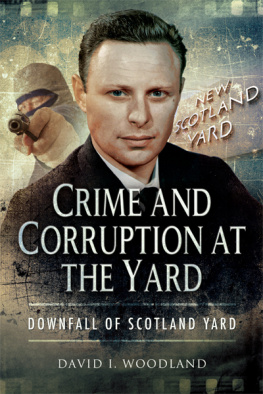
Russias Battle with Crime, Corruption and Terrorism
This book examines Russias attempts to tackle the challenges of the new and increasing security threats of rising crime, corruption and terrorism that it has experienced since the break-up of the Soviet Union in 1991. It demonstrates the close links between the rising drug trade, border problems, migration issues, organized crime, corruption and terrorism.
Uncovering information not seen before by Western audiences, this book:
shows how Russias porous borders have facilitated the operation of transnational crime groups
explores the specific features that make particular regions such as Siberia important for the drug trade and other forms of smuggling, analyzing the character of the different criminal groups and networks, and investigating the informal links and collusion between these organizations and police officials
considers the operation of corrupt practices in the military sector, one of the most closed parts of the economy
analyzes the ways in which Russia is fighting crime, corruption and terrorism, and the implications for civil liberties
argues that the extensive flows of illegal immigrants into Russia are creating ever more fertile grounds for corruption, crime and terrorism, while the immigrants themselves are often the victims of this crime.
Robert Orttung is a senior fellow at the Jefferson Institute and a visiting scholar at the Center for Security Studies at the Swiss Federal Institute of Technology Zurich. He is co-editor of Russian Business Power: The Role of Russian Business in Foreign and Security Relations and co-editor of The Dynamics of Russian Politics: Putins Reform of Federal Regional Relations .
Anthony Latta is an employee of Chemonics and a former research assistant at the Terrorism, Transnational Crime and Corruption Center (TraCCC).
Routledge Terrorism, Transnational Crime and Corruption Series Corruption Series
Published in association with the Terrorism, Transnational Crime and Corruption Center, School of Public Policy, George Mason University, USA
1 Russian Business Power
The Role of Russian Business in Foreign and Security Relations
Edited by Andreas Wenger, Jeronim Perovic and Robert W. Orttung
2 Organized Crime and Corruption in Georgia
Edited by Louise Shelley, Erik Scott and Anthony Latta
3 Russias Battle with Crime, Corruption and Terrorism
Edited by Robert W. Orttung and Anthony Latta
4 Human Trafficking and Human Security
Edited by Anna Jonsson
Russias Battle with Crime, Corruption and Terrorism
Edited by
Robert W. Orttung and
Anthony Latta
First published 2008
by Routledge
2 Park Square, Milton Park, Abingdon, Oxon OX14 4RN
Simultaneously published in the USA and Canada
by Routledge
270 Madison Avenue, New York, NY 10016
Routledge is an imprint of the Taylor & Francis Group, an informa business
2008 Robert W. Orttung and Anthony Latta for selection and editorial matter; individual contributors their contribution
All rights reserved. No part of this book may be reprinted or reproduced or utilized in any form or by any electronic, mechanical, or other means, now known or hereafter invented, including photocopying and recording, or in any information storage or retrieval system, without permission in writing from the publishers.
British Library Cataloguing in Publication Data
A catalogue record for this book is available from the British Library
Library of Congress Cataloging in Publication
Russias battle with crime, corruption and terrorism / edited by Robert W.
Orttung and Anthony Latta.
p. cm. (Routledge Transnational crime and corruption series)
Includes bibliographical references and index.
1. Organized crimeRussia (Federation) 2. CrimeRussia (Federation) 3. CorruptionRussia (Federation)Prevention. 4. Drug trafficRussia (Federation)Prevention. I. Orttung, Robert W. II. Latta, Anthony, 1981
HV6453.R8R88 2008
364.947dc22
2008005768
ISBN 10: 0-415-42823-8 (hbk)
ISBN 10: 0-203-89265-8 (ebk)
ISBN 13: 978-0-415-42823-1 (hbk)
ISBN 13: 978-0-203-89265-7 (ebk)
Contents
| 1. |
| ROBERT W. ORTTUNG |
| 2. |
| ELENA TYURYUKANOVA AND ELENA KOSTYRYA |
| 3. |
| VALERII V. SOBOLNIKOV |
| 4. |
| SERGEI V. GOLUNOV, VADIM V. ASTASHIN, SVETLANA B. KOZHIROVA, GRIGORY L. OLEKH AND LIUDMILA M. RESHETNIKOVA |
| 5. |
| ALEXANDER SALAGAEV, ALEXANDER SHASHKIN AND ALEXEY KONNOV |
| 6. |
| ANDREI S. MAKARYCHEV |
| 7. |
| IRINA OLIMPIEVA AND OLEG PACHENKOV |
| 8. |
| NABI ABDULLAEV AND SIMON SARADZHYAN |
List of illustrations
Figures
Tables
Contributors
Nabi Abdullaev is a staff writer at the Moscow Times .
Vadim V. Astashin is a docent at Volgograd State University, Volgograd, Russia.
Sergei V. Golunov is a docent at Volgograd State University and the director of its Center for Regional and Trans-boundary Studies, Volgograd, Russia.
Alexey Konnov is a PhD student at Kazan State Technological University in the Department of Public Administration and Sociology, Kazan, Russia.
Elena Kostyrya is a researcher based in St. Petersburg.
Svetlana B. Kozhirova is a docent at Eurasia National University in Astana, Kazakhstan.
Anthony Latta is an employee of Chemonics and a former research assistant at the Terrorism, Transnational Crime and Corruption Center (TraCCC).
Andrei S. Makarychev is a professor at the Nizhny Novgorod Linguistic University.
Grigory L. Olekh is a professor at Novosibirsk State Academy of Water Transport, Novosibirsk, Russia.
Irina Olimpieva is the head of the Social Studies of the Economy Program at the Center for Independent Social Research in St. Petersburg, Russia.
Robert W. Orttung is a senior fellow at the Jefferson Institute and a visiting scholar at the Center for Security Studies of the Swiss Federal Institute of Technology.
Oleg Pachenkov is deputy director of the Center for Independent Social Research in St. Petersburg, Russia, and a researcher there.
Liudmila M. Reshetnikova is a research fellow at the Center of Regional and Trans-boundary Studies at Volgograd State University, Volgograd, Russia.
Alexander Salagaev is a professor at Kazan State Technological University and director of the non-governmental organization Centre for Analytic Studies and Development, located in Kazan, Russia.
Simon Saradzhyan is managing editor at the Moscow Times and a consultant for the Belfer Center for Science and International Affairs, Harvard University.


